Energy costs skyrocketed during 2022, with many UK households and businesses now paying more than double for their electricity and gas compared to 2021. To help domestic users pay their bills, the government introduced an energy price cap to keep a lid on prices. The average user’s energy bill is now capped at £2500 per year. However, there is no energy price cap for businesses. Instead, the UK Government has introduced the Energy Bills Discount Scheme to deliver discounts off expensive wholesale energy prices for non-domestic users.
How does this new scheme work? Read on to find out more about the plan and to discover ways to save on your business’ electricity and gas.
What is the Energy Bills Discount Scheme?
The UK Government has introduced the Energy Bills Discount Scheme for non-domestic energy users, which replaces the previous Energy Bill Relief Scheme (EBRS). These schemes aim to help overcome the energy crisis that has been forcing business closures across the country and it will reduce wholesale gas and electricity costs for UK business energy customers. The Energy Bills Discount Scheme operates until March 31st 2024, benefitting businesses, SME, charities, and public sector organisations, and is equivalent to the Energy Price Guarantee put in place for households.
Does this energy price cap apply to UK businesses?
The Energy Bills Discount Scheme is NOT a business energy price cap. It is a discount scheme. Businesses will automatically see a reduction off their total energy bills, but there is no limit (a cap) to the sums they will pay. Because of the huge spike in wholesale energy prices, many organisations are still seeing significant jumps in their energy costs from the same period last year – although their bills will be lower than they would have been if the scheme was not in place.
How does the Energy Bills Discount Scheme work?
From 1 April 2023 to 31 March 2024, eligible business customers who have a contract with a licensed energy supplier will see a unit discount of up to £6.97/MWh automatically applied to their gas bill and a unit discount of up to £19.61/MWh automatically applied to their electricity bill, (except for those already benefitting from lower energy prices).
A significantly higher level of support will be provided to businesses in sectors identified as energy and trade intensive – predominately manufacturers. These businesses will receive a gas and electricity bill discount based on a supported price which will be capped by a maximum unit discount of £40.0/MWh for gas and £89.1/MWh for electricity.
Important: Businesses who are buying energy at prices less than the government’s ‘wholesale price threshold’ will not receive energy support under the new scheme. Wholesale price thresholds are:
For most businesses: 107/MWh for gas and £302/MWh for electricity.
For energy intensive businesses: £99/MWh for gas and £185/MWh for electricity. Discounts will only apply to 70% of energy volumes and are subject to a ‘maximum discount’ of £40.0/MWh for gas and £89.1/MWh for electricity.
What can I do to reduce my business energy bills?
- Turn off all non-essential equipment when the business is closed
Even when not in use, ‘vampire’ machines and devices such as computers, printers, and copiers, continue to burn energy in ‘sleep mode’. Turn off everything you can at the end of the business day.
- Conduct an energy audit of your business
You can’t make savings if you don’t know what is using what or where the wastage is. A business energy audit runs a fine-tooth comb over the business, revealing all the areas where savings can be made.
- Maintain steady heat and A/C
Don’t fiddle with the heating and A/C controls. Constant adjustment wastes energy and costs money. Set a comfortable temperature and let the thermostat to the rest.
- Switch from electric to gas for heating
Even with the cost of installation, it may work out cheaper in the long run to heat your premises with natural gas than higher priced electricity.
- Keep heating and cooling vents clear
Warm and cool air needs to circulate to be effective. Obstructing the air flow from vents with furniture or other obstacles will make your heating and A/C less efficient and consume more energy.
- Cool down for less
Air conditioning is costly to use, with the typical central A/C unit consuming 3500 watts per hour when running. Other cooling methods, such as desk and ceiling fans run for a tiny fraction of this energy cost. A/C systems also need clean air flow for best efficiency. Changing filters every six months can cut 5 to 15% off your air conditioning’s energy consumption.
- Reduce hot water use
It costs money to heat water. Consider ways to lower the hot water use in your place of business. This means everything from leaky hot water taps to over-filled kettles and unnecessary vehicle cleaning.
- Switch supplier
It may not reduce your business energy consumption, but it could lower the price you pay per unit. If you can switch supplier without incurring a penalty, shop around for the best quote available.
Lastly, the three most effective ways to reduce your business energy bill are to make sure you’re paying the lowest rate of VAT, that you’re on the best electricity and gas tariffs, and that you’re claiming every refund and exemption you’re entitled to. Fortunately, this is easy to do. Get in touch with Swoop and speak to an energy export to help you find the best tariffs, pay the lowest VAT, and keep your energy costs in check.
Swoop requires writers to use primary sources to support their work. These include white papers, government data, original reporting, and interviews with industry experts. We also reference original research from other reputable publishers where appropriate.

































 yet? Register here!
yet? Register here!